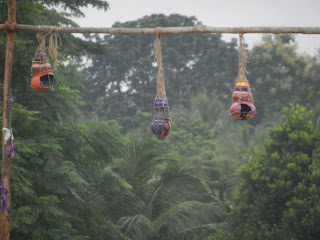Over the next few days I will be wrapping up a few loose ends from my time here. In the last week or so, quite a lot has happened here with the work I've been doing.
I heard the great news that the stove I ordered for an institution in Gulbarga has finally been delivered to the right place, and the clients have been using it. So far, initial trials seem to be going well, and over the next two months more testing will be carried out. It sounds like the guys there really like the stove, and are interested to get some more so they can carry out all their cooking on them, however its difficult to assess how much of the enthusiasm comes from SELCO having initially paid for the first stove on their behalf. Assuming the stove is used correctly, I think that they should make savings that will start to pay off quickly, while saving the women who cook for 100+ people, three times a day from inhaling large amounts of harmful smoke.
Also, our designs for a paddy separator tray have materialised as a neatly welded and nicely painted steel machine! We've assembled most of it, and managed to create an ugly but (hopefully) effective linkage for the motor (see below for a bit of over-zealous welding by a college technician, assisted by Seb.)
 |
| Seb "Sea-Bass" Burn assisting with some welding and managing to burn his hand through the terrible quality welding gloves... Well at least they had some, unlike most places! |
 |
| The paddy separator design almost constructed... |
I've also finished a rather complicated Solidworks model of the paddy transplanter which I've mentioned in previous posts. Since it fell off a bus (yes, that actually happened, somehow) at the end of last transplanting season, its been a little worse for wear. I've made some modifications to improve the design, and so that new parts can be built at a workshop near here.
 |
| Solidworks model of a paddy transplanter with a few modifications (and accidentally a bit shiny) |
In other news, we've had a new face in the office (and our appartment) since Sameer arrived from the US to work with SELCO for the next year. Its been great fun so far, and I think he'll do a fab job here.
Finally here's a video I made while we were at a waterfall near Ujire... (put the quality up so it looks good :) )


























